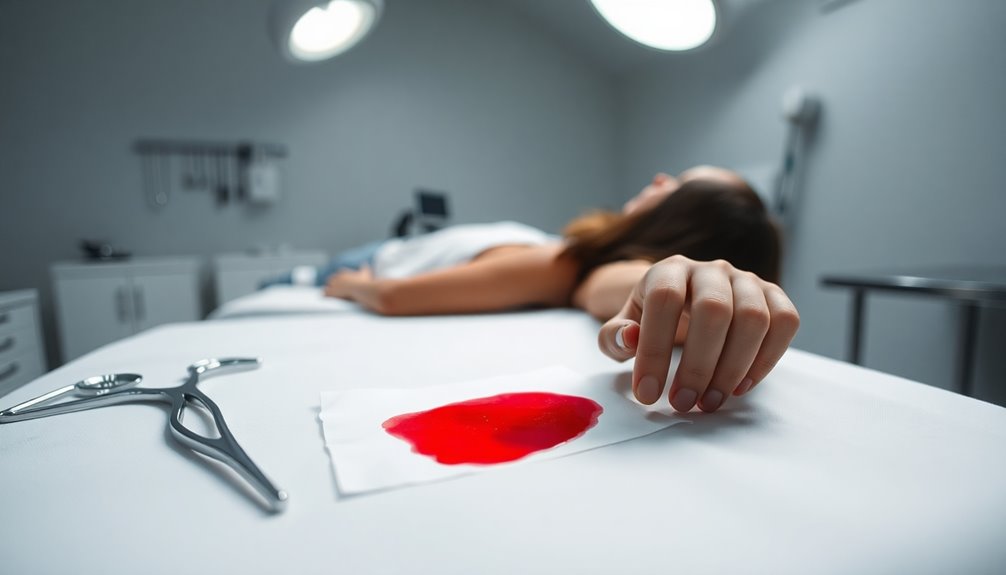If you bleed after sex, it could be due to several reasons, such as vaginal dryness, cervical polyps, or infections like cervicitis. This bleeding might appear as bright red or brown spotting and can occur alongside discomfort. Hormonal fluctuations, particularly from contraceptives, also play a role in cervical ectropion. Though occasional light bleeding isn't unusual, persistent or heavy bleeding should prompt a visit to a healthcare professional. Keeping track of the occurrence can help you better discuss your symptoms. There's more to understand about this condition and its implications for your health.
Key Takeaways
- Postcoital bleeding can occur due to insufficient lubrication, leading to vaginal tearing and irritation during intercourse.
- Cervical ectropion, common in hormonal contraceptive users, may cause bleeding after sex.
- Sexually transmitted infections like chlamydia and gonorrhea can inflame the cervix, resulting in bleeding.
- Vaginal or cervical infections can weaken blood vessels, contributing to postcoital bleeding.
- Structural issues like cervical polyps or anatomical abnormalities can also lead to irritation and bleeding during or after sex.
Understanding Postcoital Bleeding

Have you ever noticed unexpected bleeding after sex? This phenomenon, known as postcoital bleeding (PCB), affects about 9% of women of reproductive age. You might experience bright red or brown spotting following intercourse.
One common cause is vaginal dryness, which can lead to irritation and bleeding. Additionally, cervical polyps, small benign growths on the cervix, may also contribute to this issue.
Infections, trauma during sex, and hormonal imbalances can play a role too. If you encounter persistent or heavy bleeding, it's essential to consult a healthcare professional.
They'll likely take a thorough medical history, conduct pelvic examinations, and may recommend tests like Pap smears or ultrasounds to identify any underlying conditions.
Don't ignore these symptoms; your health matters.
Common Causes of Bleeding

Postcoital bleeding can stem from various common causes that are important to recognize.
Insufficient lubrication might lead to vaginal tearing and irritation during intercourse, particularly if you're experiencing hormonal changes or menopause-related dryness.
Cervical ectropion, where cervical cells extend outside the cervix, often occurs in those using hormonal contraceptives, resulting in minor bleeding after sex.
Sexually transmitted infections (STIs) like chlamydia and gonorrhea can also cause postcoital bleeding due to cervical inflammation.
Additionally, cervical polyps, which are benign growths, might become irritated during sexual activity, leading to bleeding in some individuals.
Finally, vaginal infections such as vaginitis or cervicitis can weaken blood vessels, contributing to bleeding during or after sex.
Risk Factors to Consider

When you experience bleeding after sex, it's important to contemplate certain risk factors.
Anatomical abnormalities, like cervical ectropion, can play a significant role, as can hormonal imbalances that disrupt your menstrual cycle.
Understanding these issues can help you address any underlying concerns effectively.
Anatomical Abnormalities
Anatomical abnormalities can considerably influence your sexual experience, leading to discomfort and bleeding. Conditions like cervical ectropion may cause cervical cells to extend beyond the cervix, increasing sensitivity and resulting in bleeding during or after intercourse.
Uterine fibroids, common among women of reproductive age, can lead to heavy menstrual and postcoital bleeding. Other issues, such as a vaginal septum or double uterus, might create abnormal bleeding patterns.
Trauma from narrow vaginal canals or vaginal prolapse can irritate tissue, causing further bleeding. Additionally, inadequate lubrication due to anatomical variations can heighten friction, leading to lacerations and bleeding, especially in postmenopausal women.
It's essential to seek medical advice if you experience persistent issues related to these anatomical abnormalities.
Hormonal Imbalances
Hormonal imbalances can considerably impact your sexual health, leading to unwanted bleeding after sex. Low estrogen levels can cause vaginal dryness, increasing irritation and friction during intercourse, which may result in postcoital bleeding.
Conditions like polycystic ovary syndrome (PCOS) can disrupt your hormones, leading to irregular cycles and potential bleeding. Hormonal fluctuations throughout your menstrual cycle, especially around ovulation, can make your cervical tissue more sensitive, heightening the risk of bleeding.
Additionally, using hormonal contraceptives might lead to cervical ectropion, where fragile cervical tissue bleeds easily during or after sex. Stress and lifestyle choices can also contribute to these hormonal imbalances, further complicating your menstrual regularity and increasing the chances of postcoital bleeding.
Symptoms and Presentation

What does postcoital bleeding look like? It can vary markedly in appearance and intensity. You might notice bright red or brown blood, ranging from light spotting to heavier bleeding that lasts from moments to several days after sex. This bleeding typically occurs after vaginal penetration, whether from a penis, toy, or fingers.
Keep an eye out for these symptoms:
- Abnormal vaginal bleeding following intercourse
- Discomfort during sex
- Recurring episodes of bleeding
- Bleeding outside your menstrual cycle
- Any accompanying pain or discomfort
Recurrent or heavy postcoital bleeding can signal an underlying cause, so it's essential to monitor the frequency and severity.
Addressing these symptoms can help guarantee your overall health.
Diagnosis and Evaluation

When you experience bleeding after sex, a thorough evaluation is essential.
Your doctor will likely perform a physical examination to check for any abnormalities, and they may recommend laboratory tests to rule out infections or hormonal issues.
Understanding these diagnostic procedures can help you get to the root of the problem and find effective treatment.
Physical Examination Techniques
A thorough physical examination is essential for diagnosing the cause of postcoital bleeding. During your visit, your healthcare provider will likely perform a pelvic exam to identify any abnormalities.
Here's what to expect:
- Visual inspection for lesions or tears
- Use of a speculum to check the cervix and vagina
- Assessment for cervical ectropion or polyps
- Collection of samples for Pap smears and STI screenings
- Possible transvaginal ultrasound to identify fibroids or cysts
These steps help determine why bleeding happens and if there are any abnormal vaginal findings.
A detailed medical history will also guide your provider in understanding your symptoms, sexual history, and the timing of the bleeding. This thorough approach guarantees you receive the appropriate care.
Laboratory Testing Procedures
To effectively diagnose the cause of postcoital bleeding, laboratory testing plays an essential role in evaluating your condition.
Your medical history will guide the testing process, starting with a pregnancy test to rule out complications. STI screenings for chlamydia and gonorrhea are vital, as these infections can lead to cervicitis, contributing to bleeding.
A Pap smear may also be performed as part of your Cervical Cancer Screening, helping to identify abnormal cells. Additionally, blood tests can assess hormonal levels and detect anemia from heavy bleeding.
Finally, transvaginal ultrasounds are often utilized to visualize pelvic organs, allowing for the identification of potential issues like fibroids or ovarian cysts that could be causing your symptoms.
Treatment Options Available

Understanding the treatment options available for postcoital bleeding is essential, as they depend on the underlying cause.
Here's a quick overview of possible approaches:
- Antibiotics for infections like STIs.
- Hormonal therapies to regulate menstrual cycles and address vaginal dryness.
- Surgical interventions, such as polypectomy or hysteroscopy, to remove cervical polyps or lesions.
- Vaginal lubricants to alleviate dryness during intercourse, especially if you're experiencing issues related to uterine prolapse.
- Counseling or therapy for psychological factors that may heighten anxiety about bleeding.
Managing Bleeding During Pregnancy

If you experience bleeding after sex during pregnancy, it's important to understand the common causes and monitor your symptoms closely.
Keeping track of any changes and discussing them with your healthcare provider can help guarantee your safety and that of your baby.
Don't hesitate to seek medical guidance if you notice persistent bleeding or discomfort.
Common Causes Identified
While experiencing bleeding after sex during pregnancy can be concerning, it's important to recognize that it often stems from benign causes. Up to 20% of pregnant individuals encounter vaginal bleeding, with most cases not indicating serious issues.
Here are some common causes of postcoital bleeding during pregnancy:
- Increased blood flow to the cervix, making it sensitive
- Changes in the cervix due to hormonal fluctuations
- Infections that may irritate the vaginal area
- Physical trauma from intercourse
- Other minor issues that typically resolve on their own
Always discuss any postcoital bleeding with your healthcare provider to rule out complications like placental abruption or previa.
Regular prenatal check-ups are essential for monitoring your health and ensuring the well-being of you and your baby.
Monitoring Symptoms Closely
Monitoring your symptoms closely is vital when experiencing postcoital bleeding during pregnancy. Increased blood flow to the cervix can cause this bleeding, which mightn't indicate a serious issue, but it's still important to keep track of your symptoms.
Pay attention to the frequency, duration, and color of any postcoital bleeding. This information can be invaluable when discussing your concerns with a healthcare provider.
Regular prenatal check-ups are essential for monitoring symptoms and ensuring early intervention if necessary.
Seeking Medical Guidance
When you experience bleeding after sex during pregnancy, seeking medical guidance is essential to guarantee your health and the well-being of your baby.
It's important to see a healthcare provider to discuss your symptoms and rule out any serious conditions.
Consider the following:
- Increased blood flow to the cervix can make it more prone to bleeding.
- Light spotting may be normal, but persistent or heavy bleeding requires immediate attention.
- Hormonal changes and cervical irritation can contribute to postcoital bleeding.
- Regular prenatal check-ups are vital for monitoring any bleeding.
- Always communicate openly with your healthcare provider about any concerns.
Impact of Menopause

As you enter menopause, the decline in estrogen levels can significantly affect your sexual health. Many women experience vaginal dryness, increasing friction and the risk of postcoital bleeding. About 30% of you may struggle with this dryness, leading to irritation during intercourse. Atrophic vaginitis, characterized by thinning and inflammation of vaginal walls, can also contribute to bleeding. Additionally, hormonal changes may cause cervical ectropion, heightening bleeding chances.
| Condition | Symptoms | Impact on Sex |
|---|---|---|
| Vaginal Dryness | Discomfort, irritation | Increased postcoital bleeding |
| Atrophic Vaginitis | Thinner vaginal walls | Painful intercourse |
| Genitourinary Syndrome | Urinary issues | Reduced sexual desire |
| Cervical Ectropion | Irregular bleeding | Anxiety during intimacy |
Regular check-ups are essential to address these concerns.
Prevention Strategies

Menopause can bring about various challenges in sexual health, but there are effective strategies to prevent postcoital bleeding and enhance your comfort.
Here are some prevention strategies you can adopt:
- Use water-based lubricants during intercourse to reduce friction and prevent vaginal tearing.
- Engage in sufficient foreplay to enhance natural lubrication and arousal, minimizing dryness.
- Avoid rough sexual activities; being gentle can prevent trauma to vaginal or cervical tissues.
- Schedule regular gynecological check-ups to identify and treat conditions that may increase bleeding risk.
- Maintain open communication with your partner about comfort levels and preferences to create a safer, more enjoyable experience.
When to Seek Medical Help

Are you wondering if your postcoital bleeding warrants a trip to the doctor? It's important to pay attention to your body. If you experience frequent or excessive bleeding, seek medical help, as this could indicate an underlying health issue. Also, if you notice signs of infection like fever or unusual discharge, get evaluated promptly. Sudden pain during sex should never be ignored; consult your healthcare provider immediately. Don't forget to report any changes in your menstrual patterns or abnormal spotting. For those with a family history of reproductive cancers, regular screenings are vital.
| When to Seek Help | Symptoms to Watch For |
|---|---|
| Frequent postcoital bleeding | Fever or unusual discharge |
| Sudden pain during sex | Notable changes in menstrual patterns |
| Excessive bleeding | Abnormal spotting |
Frequently Asked Questions
Is Bleeding After Sex Normal?
Bleeding after sex isn't considered normal for most people.
While occasional light spotting might happen, especially if you've had a rough encounter or if you're experiencing dryness, consistent or heavy bleeding should raise concerns.
It's essential to pay attention to your body and any patterns you notice.
If you find yourself bleeding frequently or heavily, it's wise to consult a healthcare provider for a thorough evaluation and appropriate advice.
Can Going Too Deep in Sex Cause Bleeding?
Yes, going too deep during sex can cause bleeding.
If there's insufficient lubrication, the friction might lead to trauma or tearing of the vaginal walls.
Additionally, if you're experiencing vaginal dryness or if there are underlying conditions, deep penetration can increase the risk of injury.
Always communicate with your partner about comfort levels to guarantee a pleasurable experience and reduce the chances of any potential bleeding.
Is It Normal to Wipe a Little Blood After Sex?
Wiping a little blood after sex can be relatively common for many, but it's important to pay attention to your body.
Minor bleeding might result from factors like vaginal dryness or irritation, especially if you didn't use enough lubrication.
While occasional light bleeding isn't usually serious, if it becomes persistent or heavy, you should consult a healthcare provider.
Keep an eye on any changes or additional symptoms that could indicate a more serious issue.
Is It Normal to Bleed After but Sex?
It's not uncommon to experience some bleeding after sex, but it shouldn't be a regular occurrence.
If you notice light spotting occasionally, it mightn't be a cause for concern. However, if the bleeding is persistent or heavy, it's important to consult a healthcare professional.
They can help determine the underlying cause and guarantee everything's okay.
Keeping an eye on any changes in your body is essential for maintaining your reproductive health.
Conclusion
In summary, experiencing bleeding after sex can feel like a sudden rainstorm on a sunny day—unexpected and concerning. While it's often linked to minor issues, it's essential to pay attention to your body. Just as you wouldn't ignore dark clouds gathering overhead, don't hesitate to seek medical advice if the bleeding persists or worsens. Staying informed and proactive about your health guarantees you can enjoy intimacy with peace of mind, free from worry.










